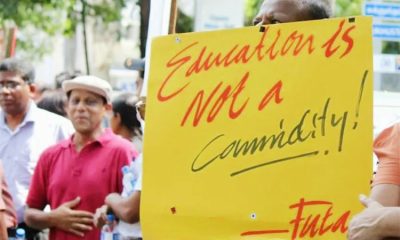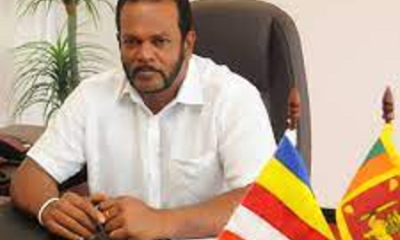Editorial
The axe falls

The signs have been ominous for the past several weeks and finally the axe has fallen. Plagued by both mismanagement and bad governance by the ruling Rajapaksas, aggravated by an ineffective opposition, the bad news is now very much here and the people have to face the harsh reality. Last week’s sharp devaluation of the rupee against the dollar, long resisted by the Central Bank and its Governor, has been forced upon the Sri Lanka economy and a population that moved from gas queues to milk powder queues and then to long lines to refuel their vehicles interspersed by blackouts and power outages countrywide will, hopefully, be spared such torment in the near term. But at a price and a very heavy price at that, that most people would not be able to afford. But for how long? We can only hope that a benevolent deity will smile down on this tormented land.
The economic indicators are grim. The foreign exchange liabilities of the Central Bank exceeded its reserve assets by Rs. 662 billion (USD 3.29 bn.) in January this year, up from Rs. 386 billion (USD 1.9 bn.) a month earlier. The situation today must necessarily be worse with the country struggling to repay debt and being compelled to utilize reserves to pay for vital imports. We have been printing money as though there is no tomorrow and this has been going on for a long time. Cash savings of people have been wiped out in value terms in a country that had long been advocating savings as a means of strengthening the economy. Those who held what funds they had in fixed income instruments like fixed deposits have taken a heavy blow while those who invested in real assets like land and property or even a vehicle have been relatively unscathed. However, it is still too early to say whether capital appreciation of real estate in the current scenario will continue as in the past.
Government leaders have been urging patience on a population that is running out of that, or more correctly, already run out of it. No less than the president assured that the power problem will be over by March 5. But that was not to be. Ministers Lokuge and Gammanpila kept making contradictory statement with the ground situation proving Gammanpila right. The Lanka Indian Oil Company (LIOC), the Indian player in Sri Lanka’s oil import and distribution market, raised prices four times since Dec. 21 last year. The Ceylon Petroleum Corporation (CPC) which controls the larger market share did not follow suit though both players have been stridently claiming that they are selling below procurement cost. The obvious result of LIOC fuel, both petrol and diesel, being much more expensive than CPC’s, consumers tanked-up at CPC filling stations unless they were forced to do otherwise. The net result is that already high CPC losses swelled further.
The grim reality is that CPC must raise its prices sooner than later. The government, obviously, is all too aware of the ramifications of a fuel price increase which is all encompassing. Public transport fares must go up; so also the price of produce that must be moved to markets. The implications are far and wide but the evil day will soon be with us. The CPC, initially, would hike prices to be on par with LIOC, and thereafter both companies needing to match their sale prices with the cost of procuring supplies will demand further price increases. These no doubt will be granted. There is a Tamil proverb that the man who is already wet does not feel the rain. People hit with price rises for all essentials, leave apart the few luxuries that makes life tolerant, may (hopefully from the rulers’ viewpoint) like the man who got wet in the rain not feel the effect of this one too badly. We need not labour the fact that the impact of the devaluation will be all pervading.
There have been indication that the hard line resistance towards going to the IMF for assistance is weakening. A structural adjustment facility (SAF) from the Fund in 1978 greatly assisted President J.R. Jayewardene’s big bold stroke of freeing the economy shackled for decades by state controls. There were conditions for that including a sharp depreciation of the rupee from then prevailing exchange rates. Older readers may remember that the National Savings Bank (NSB) at that time paid as much as 22% for one-year fixed deposits. There was a surge in imports and demand pent-up over several years was satisfied. So much so that Mr. Lalith Athulathmudali, then minister of trade and shipping, once declared that people may tolerate high prices up to a point, but never again scarcities. Fifty years later they have been forced to tolerate both.
The IMF has warned that the Central Bank may lose control of money and the economy could implode unless money printing was stopped. There are signs that this advice is now being taken, although late. It said in a statement that Sri Lanka’s public debt, including Central Bank liabilities, has risen to 119 percent of gross domestic product (GDP). The bank is yet carrying debts to the tune of USD 1.2 billion to the IMF from previous currency crises. The president will chair an All Party Conference, something it was hitherto reluctant to do, within the next few days. As SJB front-liner Harsha de Silva, a knowledgeable economist recently said, “We’re all in this together.” Now is not the time for the cheap politics that has long plagued this country. The right thing must be done. But do we have the leaders to do it? That is the question.
Editorial
Spectre of regional war looms

Saturday 20th April, 2024
The Gaza conflict shows signs of spiralling into a much broader war, which is likely to threaten world peace and destabilise the global economy. Friday’s Israeli missile and drone strikes on the Iranian city of Isfahan, which is said to be home to several nuclear facilities, has pushed the Middle East closer to a devastating regional war. One dreads to think what the situation would be in case of the Iranian nuclear facilities coming under attack. The economic fallout of Friday’s attacks was immediately felt across the globe. World oil prices rallied significantly. So did the gold prices.
The UN has been rendered impotent and the US, together with its western allies, has sided with Israel. So, it is not possible to prevent an escalation of the Israel-Iran conflict; the two belligerent nations are bent on fighting it out.
Washington raises hell if China ever so much as sends a fighter jet over Taiwan, and condemns Beijing in the strongest possible terms for doing so, but it has chosen to remain silent on the Israeli missile attacks on Iran. True, Iran should not have carried out as many as 300 missile and drone attacks on Israel on Sunday. Similarly, Tel Aviv should not have provoked Tehran by attacking the Iranian consulate in Damascus on Sunday. Hamas, which invaded a part of Israel, in October 2023, triggering the ongoing conflict, is now playing the victim card. It is also responsible for the suffering of the Palestinians, whose rights it claims to champion.
Calling for de-escalation of the Middle East conflict, US Secretary of State Antony Blinken has stressed that Washington was not involved in Friday’s attacks on Iran. But he has stopped short of commenting thereon. It may be true that the US had no direct involvement in them, but there is no way Washington can absolve itself of responsibility for what Israel is doing in Gaza as well as elsewhere.
Israel is dependent on Washington to sustain its military operations. The US not only provides military aid to Israel but also defends it at the UN, vetoing as it does the Security Council resolutions calling for a ceasefire in Gaza. It was only after seven World Central Kitchen workers had been killed in an Israel attack, two weeks ago, that US President Joe Biden felt the need to have a ‘come-to-Jesus’ telephone conversation with Israeli Prime Minister Benjamin Netanyahu, who however has not heeded Washington’s concerns.
Worse, the world powers that have taken upon themselves the task of maintaining global peace and protecting human rights, have ignored the ground-breaking International Court of Justice (ICJ) decision in South Africa’s genocide case against Israel, in January. According to experts on international law, the ICJ ruling has formalised legal obligations of all nations that are party to the UN Genocide Convention. But it has apparently had no impact on the US, Canada, etc. There have been no restrictions on arms sales to Israel. The western nations have made a mockery of their commitment to protecting human rights.
The biggest danger to global peace is that the UN has been reduced to a scarecrow, and no powerful nation takes it seriously. The US, Israel and their allies are free to unleash violence to protect their interests. The same goes for Russia. There is no international organisation capable of preventing another world war, which the Gaza conflict might lead to—absit omen.
The western-dominated UNHRC (UN Human Rights Council) demonstrates its selective efficiency. It takes on the nations that the West does not favour but cringes and crawls before the powerful countries and their allies. The UN has outlived its usefulness to all intents and purposes. One can only hope that sanity will prevail, and the world powers will realise the danger of allowing the Gaza conflict to spin out of control, and do everything in their power to rein in Israel and Hamas and eliminate the root causes of the Israel-Palestine conflict.
Editorial
Vroom mania of tub-thumpers

Friday 19th April, 2024
One wonders whether the Parliament of Sri Lanka, which is full of self-righteous members who moralise to the point of queasiness, has taken upon itself the task of serving as a moral compass of sorts for the nation. Its sessions are characterised by endless tub-thumping.
During the past several weeks, Parliament has torn some public officials to shreds over matters related to their salaries and perks, which have since been put on hold pending downward revisions on the grounds that the country is facing its worst-ever economic crisis, and the people are undergoing untold suffering. It has sought to win brownie points with the irate public by censuring the Central Bank officials for ‘misusing their authority’ to grant themselves huge pay hikes. But that is exactly what the MPs themselves usually do; they increase their salaries and allowances and enhance their perks, according to their whims and fancies. Worse, while probing salary issues in the state sector and setting guidelines, Parliament has admitted that it is in the dark about ministerial salaries!
The holier-than-thou MPs are now demanding duty-free vehicle permits, of all things. Who guards the guards? This is the question one asks oneself on reading media reports that the MPs are cranking up pressure on the Speaker and others to issue them with duty-free vehicle permits post-haste.
The government MPs and their Opposition counterparts seldom see eye to eye on virtually anything. They turn parliamentary debates into slanging matches, trade insults and abuse liberally, and, at times, even tuck up their sarongs and set upon one another during stormy debates, but they are always united when they further their interests. They speak with one voice when they demand duty-free vehicle permits, etc., and safeguard their privileges.
Earlier, the MPs who were entitled to duty concessions had to wait for five years to sell their duty-free vehicles. Most of them did not abide by that law, and sold their duty-free permits on the sly, but they did so at the risk of facing legal action in case of being found out. Instead of having that law strictly enforced to prevent the abuse of duty concessions for the MP and others, the Mahinda Rajapaksa government amended it, allowing duty-free vehicle permits to be sold immediately after their issuance! Thus, an unlawful practice came to be legalised.
There is no way Parliament can absolve itself of responsibility for the current economic crisis. It did precious little to prevent the economy from going into a tailspin. Now, it preposterously claims that nobody informed it of the deterioration of the economy! The members of both sides of the House, who bluster ad nauseam, are accountable for what has befallen the economy, which is receiving ICU treatment, so to speak. They must be ashamed of demanding duty-free vehicle permits at this juncture, while asking state workers and the public to be mindful of the country’s economic woes.
The least that the members of the current Parliament can do to assuage public anger, which is welling up and likely to find expression in another mega uprising sooner than expected, is to empathise with the people and share in their suffering. These worthies need to be told that the numerous luxuries they are enjoying at the expense of the public will make their counterparts in the developed world turn green with envy.
As we have pointed out in a previous comment, in Sweden, one of the richest countries in the world, only the Prime Minister is entitled to an official car. The MPs including ministers are given only bus and train passes; they are free to use cars but at their own expense without being a burden on the public. Never do they make demands like the ones the Sri Lankan MPs put forth. It is only in backward countries that politicians are deified and pampered.
Editorial
Rapacious rogues

Thursday 18th April, 2024
Tourist arrivals are on the increase, according to the Sri Lanka Tourism Development Authority. Prestigious international travel guides are very generously promoting Sri Lanka as a must-visit tourist destination. Lonely Planet says ‘endless beaches, timeless ruins, welcoming people, oodles of elephants, rolling surf, cheap prices, fun trains, famous tea and flavourful food make Sri Lanka irresistible’. The New York Times has ranked Negombo as one of the ‘52 Places to Go in 2024’. There have been numerous rave reviews, in international travel publications, about tourist attractions in Sri Lanka. But all it takes to spoil a pot of milk is said to be a smidgeon of cow dung.
A couple of videos doing the rounds on the Internet have exposed some eatery owners’ unspeakably exploitative practices such as overcharging foreign tourists and verbally abusing them. One of them is seen threatening a foreign tourist, who refuses to pay as much as Rs. 1,900 for a kottu roti, in Colombo. He was arrested on Tuesday and released on bail yesterday. The police deserve praise for prompt action.
Eatery owners are not alone in exploiting foreign tourists and hurling abuse at them; some taxi operators also exact exorbitant amounts as fare from unsuspecting foreigners, who are without anyone to turn to. Numerically insignificant as such uncivilised, greedy elements who turn aggressive and abusive at the drop of a hat may be, their sordid operations tarnish the image of the country. This is something that the state institutions tasked with promoting tourism, and all those who are engaged in the hospitality industry ought to take cognizance of.
It must be made mandatory for prices to be prominently displayed in all business places to prevent customers, including foreign tourists, from falling prey to unscrupulous businesspersons. Taxis must not be allowed to operate unless they are equipped with tamper-proof fare meters, and information about their drivers is displayed, as in countries like Singapore. The need for all taxies including trishaws to be strictly regulated to protect the rights of commuters cannot be overemphasised. Ride-hailing companies may be the best option for foreign tourists, who seek hassle-free travel.
Sri Lankans themselves suffer savage exploitation at the hands of rapacious businesses. There are various organisations representing the interests of the business community. They are making multiple demands ranging from debt moratoriums to the suspension of parate executions. They, no doubt, deserve relief and a leg-up to regain stability in these hard times, but they must be mindful of their responsibilities.
It is incumbent upon them to ensure that their members refrain from unethical practices that bring the entire business community into disrepute. They are responsible for the so-called ‘greedflation’, which has caused the prices of commodities and services to remain extremely high despite a significant decrease in the inflation rate.
Business leaders never miss an opportunity to pontificate to politicians about the virtues of transparency, integrity, etc., but shouldn’t they put their house in order before being critical of others. The rupee has been rallying against the US dollar, during the past several weeks, and the cost of production has decreased significantly, but the prices of essential commodities are increasing. Eatery owners and bakers are among those who are making a killing at the expense of the public.
The Consumer Affairs Authority is in a deep slumber, as is its wont, and it must be shaken awake and made to carry out its duties and functions diligently. It needs a radical shake-up, for some of its officials are believed to be compromised. Its much-publicised raids have stopped and traders are exploiting the public with impunity. The victims of fleecing have no alternative but to suffer in silence, and foreign travellers’ predicament is even worse for obvious reasons.
The government spends colossal amounts of state funds on tourism promotion events overseas. While such gimmicks may be necessary to attract tourists, many issues remain unaddressed at home. There is a pressing need to take stringent action against the rapacious rogues preying on foreign tourists and Sri Lankans alike.
-

 Business2 days ago
Business2 days agoCEAT Kelani launches 3 new radial tyre variants in ‘Orion Brawo’ range
-

 Business4 days ago
Business4 days agoSOEs seen as failing SL’s ordinary citizens
-

 News5 days ago
News5 days agoSay no to NEPF! Say no to abolishing free education!
-

 Midweek Review4 days ago
Midweek Review4 days agoBetween abstraction and empathy in Sarath Chandrajeewa’s visual paraphrases
-

 Business2 days ago
Business2 days agoDialog-Airtel Lanka merger comes centre stage
-

 Business2 days ago
Business2 days agoSLFEA appoints JAT as a Facilitation Partner for training painters to provide overseas employment opportunities
-

 Latest News4 days ago
Latest News4 days agoFormer Member of Parliament Palitha Thewarapperuma passes away
-

 Business4 days ago
Business4 days agoSri Lanka Tourism concludes another round of Roadshows in Australia



























